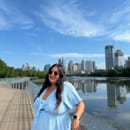As told to Lexi Williams for Her Campus.
By the time I was 10 years old, I knew how to translate phrases like “pap smear” and “breast exam” into Spanish. Most kids at that age don’t even know what those terms mean in their primary language, but my mom didn’t speak English, so I accompanied her to her Planned Parenthood appointments to help ensure she got the care she needed. Little did I know, this was actually the beginning of my career in reproductive health advocacy.
Despite my early introduction to Planned Parenthood, my understanding of my own reproductive health was severely lacking as I came of age. I grew up in a small town in Texas (where our schools followed an abstinence-first sex ed curriculum) and in a Catholic family as the eldest daughter with four younger brothers. It’s safe to say we weren’t talking about sex — let alone things like abortion or emergency contraception — on a regular basis.
So, I cobbled together my own reproductive education, constantly feeling like I was playing catch-up on information I wish I’d had much sooner. Instead of having the sex talk at home, I remember being 16 and learning about what sex was at a sleepover… and feeling like the dumbest person in the room for not already knowing. Things like birth control and emergency contraception were mysteries I had to solve on my own. When I aged out of Medicaid at age 18, I ended up traveling an hour away to go to routine appointments at the nearest Planned Parenthood, because I didn’t know where else to go without insurance.

Over the years, I’ve seen how a lack of education surrounding reproductive health has made it more difficult to make safe choices and get necessary care for my family, my friends, my community, and even for myself. But not only have I learned that education is the key to unlocking reproductive health care access — it’s also the foundation for my desire to help others unlock their own education and access as well.
I started to discover my calling toward a career in reproductive health advocacy when I became a student at Texas State University — more specifically, when I served as a senator in my school’s student government. We did all kinds of things as senators, from supporting charities to deciding what colors we should paint school buildings, but one of the most impactful things I got to participate in was creating legislation to bring free period products to campus. When the legislation passed and we succeeded in bringing our menstrual health initiative (which still exists on campus to this day) to life, it really hit me that I could make a difference in the world of reproductive justice.
From there, I got really involved in political science, one of my three majors (I like to say I got three degrees: one for my dad, one for my mom, and one for me), and this further opened my eyes to the many ways I could get involved and help those like me, who always believed in reproductive justice but didn’t have the tools or understanding to do much about it. Upon my graduation in 2019, I knew I wanted to pursue a career in this field and bring the advocacy I’d learned back to my community and others like it.
I’m living proof of what the right tools and resources can do for a person.
Today, I’m proud to be working at the National Latina Institute for Reproductive Justice, an organization that represents the U.S. Latina community in the fight for reproductive rights. I’m proud to be a Texan fighting for abortion right here in my home state, where our bodily autonomy has been under attack for years. And I’m proud to be using what I’ve learned in my own experiences and advocacy work to uplift others to do the same.
I’m living proof of what the right tools and resources can do for a person. And you know what? My family is, too. My younger brothers — all big, macho Hispanic men in college — are proud repro rights activists, coming with me to rallies and asking me to cop them pro-abortion T-shirts (because, of course, college kids love free merch). My mom and I still haven’t had the sex talk — that ship has certainly sailed — but we’ve had open conversations about abortion, something I couldn’t have imagined before I started this journey.

Now, I’m fighting for this kind of transformation across the country. I’m helping communities — especially those in red states, where reproductive rights are already severely limited and stigmatized — get the education they need in order to access crucial care, and hopefully, empower them to take action. This fall, that work revolves around getting out the vote. At the Latina Institute, we’re sharing resources and tools to help people ensure they’re registered to vote, informed about the issues at stake, and logistically prepared for Election Day. From phone and text banking, to canvassing door to door, we’re meeting people where they are, using language they understand and sharing stories that resonate with them, to give them the information they need to advocate for themselves and for others by casting their ballots.
I know my vote in the upcoming election is important, and I’m truly so excited to vote. But even more so, I’m thrilled to have the opportunity to help others step into their power as well, because everyone deserves to know what’s at stake, and what they can do to fight for their reproductive freedom.






